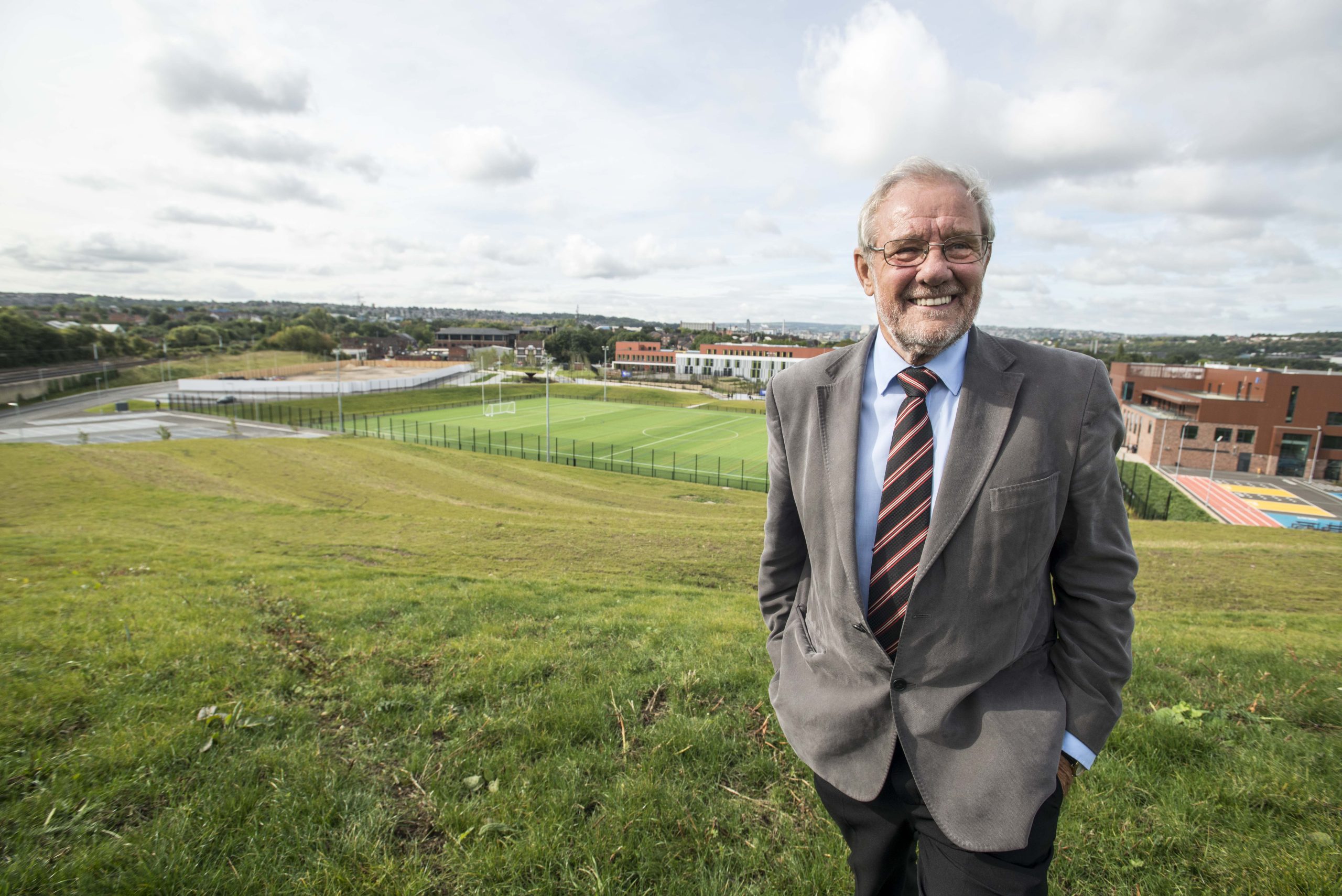Throughout a long parliamentary career Richard Caborn was never short of causes to champion.
And little has changed, even though he left Westminster seven years ago. These days the focus is on flying the flag specifically for the economic regeneration of the Sheffield City Region.
The commitment, determination and enthusiasm that marked his 28 years as a Sheffield MP – ten as a government minister – is being channelled into supporting and highlighting the region’s emerging new economic identity.
It’s a drive that underlines the achievements so far in establishing a reputation for excellence in high value manufacturing, the digital and creative industries, sports-related industries and education and training – achievements that already rank as world class, says the former Sheffield MP.
Moreover, there is a lot more to come, he insists.

In particular, the Sheffield Olympic Legacy Park on the site of the former Don Valley Stadium continues to offer a winning formula, while the more established Advanced Manufacturing Research Centre at Catcliffe has created a template of local and national significance capable of further expansion.
Increasingly on the radar are moves to attract some of Channel 4 TV’s operations to Sheffield allied to creation of a National Screen Industries Institute that would put the city at the heart of new and emerging digital technologies.
So there is plenty to keep Richard busy on his home patch.
Crucially, he points to the model that has proved to be the bedrock of successes so far – one that brings together the expertise and experience of the two Sheffield universities, its hospitals, the private sector and the local authority.
The momentum continues to grow, so much so that it’s time to start proclaiming a little louder the innovation and technology that is beginning to redefine the region, says Richard.
The message needs to go further and deeper, especially in convincing central government that the region should get recognition and financial help as a result of it meeting the demands for greater productivity and competitiveness.
“We are not singing our song loud enough,” says Richard. “We have some phenomenal people in this city – ordinary people doing extraordinary things – and the institutions we are building are internationally-renowned.
“But I think we have to be much bolder in our dealings with central government.
“If they are serious about helping to boost the North’s productivity and competitiveness, then they have to be aware that we have got some of the answers. In the past, I think Sheffield has been timid in its requests to government.”
Richard points out that the approach being taken in the Sheffield City Region is in line with the Government’s recently announced Strategy for Industry which seeks to intervene in key sectors to tackle weak productivity and bolster businesses.
Business Minister Greg Clark spoke about the need for Britain to capitalise on some of the world’s best universities and research institutions, as well as leading companies in sectors ranging from advanced manufacturing to financial services, life sciences and creative industries.
The Government announcement shows that the region is already on the right track, says Richard.
At the Sheffield Olympic Legacy Park, Richard chairs the board that includes representatives of Sheffield Teaching Hospitals NHS Foundation Trust, Sheffield Hallam University, the British Olympic Association and the city council.
The brief was to replace Don Valley Stadium, which was losing £750,000 a year, with a sports, health and education campus that would generate lasting improvements in public health, well-being and learning in the wake of the 2012 London Games. It was to be for elite and community use.
The results have followed quickly since the demolition of the stadium in 2013.
So far the site has been redeveloped to include Oasis Academy Don Valley, a school for 1,200 two to 16-year-olds, and a University Training College specialising in health sciences, sport science and computing for up to 600 13 to 19-year-olds.
A 3G pitch will allow Sheffield Eagles Rugby League Club to return to Don Valley and is also open to school and community use.
Construction is due to start next year on the Advanced Wellbeing Research Centre, backed by Sheffield Hallam University and with sponsors Toshiba Medical and Westfield Health. It will be a research hub for the National Centre for Sports and Exercise Medicine.
Meanwhile, two world class research and technology centres in healthcare are set to massively boost the Park’s reputation.
The Centre for Child Health Technology will be led by Sheffield Children’s Hospital, the Orthopaedic and Rehabilitation Research and Innovation Centre by Sheffield Teaching Hospitals.
Richard, a former Sports and Trades Minister, describes progress on the 35-acre Attercliffe site as “absolutely fantastic” and the result of a “great team effort.”
It is now part of a sports, health, leisure and education corridor stretching from Hallam University’s Woodbourn Road athletics stadium to Broughton Lane and the Arena, also encompassing the English Institute of Sport (EIS) and iceSheffield.
“The Sheffield Olympic Legacy Park is being recognised nationally and internationally. When we wanted to use the word ‘Olympic’, the International Olympic Committee challenged us. It’s a protected word. But after talking to the British Olympic Association, they agreed that we are part of the legacy of the 2012 Games.
“We are the first city outside the Olympic cities to be allowed to use the word ‘Olympic’ in recognition of what we are doing.”
Further along the Don Valley, near the M1, collaboration between the University of Sheffield and private sector has produced a state-of-the-art manufacturing park.
Founded in 2001, the Advanced Manufacturing Research Centre carries out world-leading research into advanced machining, manufacturing and materials. More than 100 industrial partners range from global giants such as Boeing, Rolls Royce, BAE Systems and Airbus to small companies.
Last February high-performance sports car manufacturer McLaren Automotive launched a pioneering partnership with the University of Sheffield for a new composites centre where the advanced carbon fibre chassis for its super cars will be built.
The AMRC’s success in the core areas of aerospace, energy/nuclear and medical has spawned expansion in the shape of the University of Sheffield’s Factory 2050 at the Sheffield Business Park on the other side of the Parkway.
“We are meeting a real need to provide world leading, high value manufacturing and making a major contribution to the competitiveness of British manufacturing,” says Richard, who is strategic adviser to the AMRC. “High value manufacturing is in our DNA.
“The AMRC has been hugely successful, and now we are coming up against land and skill constraints. We are trying to address the land issue in discussions with Rotherham and Doncaster and others.”
To help provide an increasingly skilled workforce, the AMRC has a successful apprenticeship training programme.
Around 250 apprentices a year from Sheffield, Rotherham, Barnsley, Doncaster and Chesterfield go through the pioneering programme, which combines on-the-job training with the opportunity to gain a doctorate in engineering from a red-brick university. Each apprentice is sponsored by an employer.
“We are training the workforce of the future, both at the AMRC and the OLP,” says Richard, whose background is in engineering and who was Labour MP for Sheffield Central from 1983 to 2010.
And he hopes that a firm foothold in the creative and digital industries can be further strengthened by attracting Channel 4 operations, currently based in London, to Sheffield city centre, alongside a National Screen Industries Institute.
Sheffield’s record in annually hosting DocFest – the International Documentary Film Festival – and the Children’s Media Festival makes a good fit with at least two of C4’s commissioning arms.
Richard chairs the committee leading Sheffield’s bid to the Government in competition with other authorities. Land near the railway station is being offered as a potential location.
He is especially excited by the potential for a National Screen Industries Institute that would “put the city at the heart of new and emerging digital technologies”.
It’s a familiar theme. For the institute would bring together the private and public sectors to develop world-leading digital technologies based on the model of the Sheffield Olympic Legacy Park and AMRC.
“We have creative and digital sectors that are second to none outside London,” says the former MP, who is also an unpaid business ambassador to the city council.
In general, he adds: “We are moving our core skills into the 21st century. The institutions we are building are internationally renowned, building on the great partnerships with the two universities, a leading teaching hospital, a children’s hospital and the private sector.
“We are different in that we have not gone for the service sector. We are making things for people who want to buy them at the right price.
“With the Sheffield Olympic Legacy Park and AMRC and other projects, we are becoming more ambitious and believing we can be the economic driver for the city and the region.
“We are building our skills base to meet the government’s agenda of being productive and competitive – and it’s exciting.”








